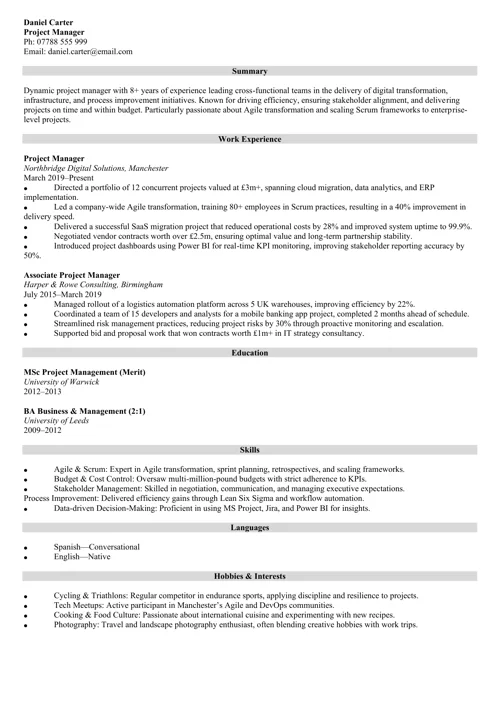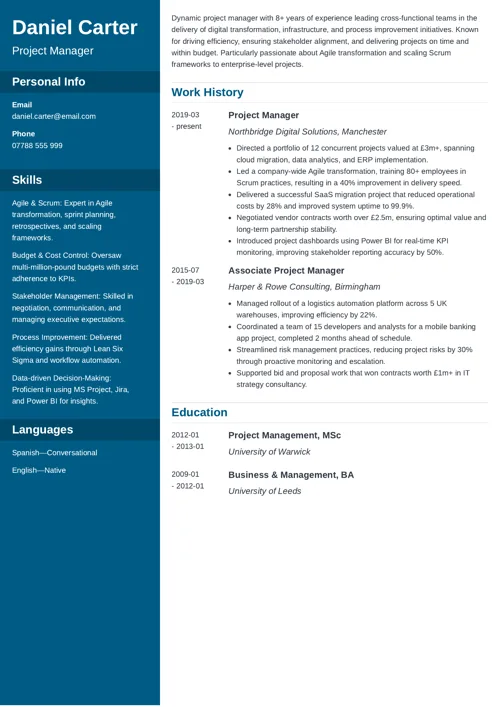25 High-Paying AI-Proof Jobs in the UK
Create your CV nowAI is transforming industries, but many careers rely on qualities that machines cannot replicate. Empathy, creativity, dexterity, or leadership are traits still highly valued by recruiters. While some jobs may evolve, others will remain distinctly human, offering security and high earnings in the UK.
In this article, I’ve listed 25 AI-proof jobs, together with their value, potential earnings, human advantages, and how to start working in one of these roles.
Want to save time and have your CV ready in 5 minutes? Try our CV builder. It’s fast and easy to use. Plus, you’ll get ready-made content to add with one click. See 20+ CV templates and create your CV here.
Sample CV made with our builder—See more templates and create your CV here.
One of our users, Nikos, had this to say:
[I used] a nice template I found on Zety. My CV is now one page long, not three. With the same stuff.
1. Author / Writer
Authors and writers produce stories, articles, and content that connect deeply with readers. Their work requires a unique perspective, emotional intelligence, and the ability to craft a distinct voice. While AI can generate text, it can’t deliver authentic storytelling or cultural relevance.
- 💰 Salary: £31,618; bestselling authors and niche specialists can earn far more.
- 🤖 AI Risk: Low. Genuine creativity and emotional impact remain human.
- 🎓 Path: No degree required, though English or journalism helps; build a portfolio and persist.
2. Graphic designer
Graphic Designers turn concepts into visuals, shaping brand identities through logos, layouts, and marketing materials. They balance aesthetic intuition with communication, working closely with clients to translate abstract ideas into compelling visuals. AI design tools exist, but they often produce generic results that require human interpretation.
- 💰 Salary: £29,540; senior art directors £40k+.
- 🤖 AI Risk: Low–Medium. Clients need personal vision and collaborative input.
- 🎓 Path: Design degree or diploma useful; portfolio is critical.
3. Chef / Culinary artist
Chefs and culinary artists craft flavours, textures, and experiences that excite diners and reflect culture. Their creativity transforms food into art, requiring constant experimentation and adaptation to seasonal ingredients. AI can suggest recipes, but it can’t taste, smell, or improvise in a busy kitchen.
- 💰 Salary: Sous chefs £29,236; head chefs £35,277 +; celebrity chefs earn more.
- 🤖 AI Risk: Very Low. Cooking requires a combination of manual dexterity with food and utensils, sharp senses, and creativity.
- 🎓 Path: Apprenticeships or catering college, plus years of practice.
4. Actor / Performer
Actors and actresses bring scripts to life through body language, timing, and charisma. Whether on stage or screen, they channel human emotion in ways that no synthetic avatar can replicate. Even with digital effects, audiences crave the presence and authenticity of real performers.
- 💰 Salary: £30,713; film stars can reach six or seven figures.
- 🤖 AI Risk: Low. Human spontaneity and emotional nuance can’t be replicated.
- 🎓 Path: Drama school or grassroots experience in theatre/indie film; resilience essential.
5. Fashion designer
Fashion designers conceive clothing and accessories that influence culture and self-expression. Their work blends artistic vision with practical craft, anticipating trends and shaping identity. While AI can analyse past data, it can’t set the next wave of style or understand what makes people feel confident in their clothes.
- 💰 Salary: £33,454; top designers six figures.
- 🤖 AI Risk: Low. Style is human-led, emotional, and cultural.
- 🎓 Path: Fashion design degree + standout portfolio; internships build experience.
💡 Read more: Creative CV Templates
6. Cybersecurity specialist
Cybersecurity professionals defend systems against cybercriminals, identifying vulnerabilities and responding to breaches. They think like hackers to stay ahead, constantly adjusting strategies as threats evolve. AI may help scan for risks, but only humans can interpret novel attacks and weigh business impact.
- 💰 Salary: £58,240; senior consultants six figures.
- 🤖 AI Risk: Low. Adapting to evolving threats requires creativity.
- 🎓 Path: IT/CS background; certifications like CEH or CISSP.
7. Cloud solutions architect
Cloud architects design and oversee the digital infrastructure businesses rely on. They balance cost, compliance, and scalability, tailoring systems to unique organisational needs. While AI can optimise resources, it can’t make strategic trade-offs across complex environments.
- 💰 Salary: £80k–£100k; senior roles £100k–£150k.
- 🤖 AI Risk: Low. Big-picture planning requires human accountability.
- 🎓 Path: IT degree, plus AWS/Azure certifications.
8. Software developer / Engineer
Software developers and software engineers create the applications and systems people use daily. They blend problem-solving, logic, and creativity to build user-focused solutions. AI coding tools assist with boilerplate, but developers still make key architectural decisions.
- 💰 Salary: £90,527
- 🤖 AI Risk: Low–Medium. Human oversight is required for complex systems.
- 🎓 Path: Degree or coding bootcamp; portfolio of projects essential.
9. DevOps engineer
DevOps engineers streamline development and operations, ensuring smooth deployment pipelines and reliable systems. They design automations, manage infrastructure, and troubleshoot incidents when things go wrong. AI helps with monitoring, but engineers adapt workflows to human teams and the unique quirks of each system.
- 💰 Salary: £52,986
- 🤖 AI Risk: Low. Complex environments need human adaptability.
- 🎓 Path: Background in software or IT ops; cloud and automation expertise.
10. Network engineer
Network engineers keep organisations connected through reliable data flow. They design, install, and troubleshoot networks to ensure speed and security. AI may monitor traffic, but when novel issues arise or hardware fails, humans step in.
- 💰 Salary: £42,396
- 🤖 AI Risk: Low. Physical repairs and judgment remain essential.
- 🎓 Path: IT/telecom degree; Cisco/CompTIA certifications.
💡 Read more: Technical Skills for a CV
11. Electrician
Electricians install and maintain wiring and circuits in buildings and industrial sites. Each job presents unique conditions, requiring both technical skill and creative adjustments. Robots can’t crawl into walls or safely navigate live systems the way a trained human can.
- 💰 Salary: £33,549
- 🤖 AI Risk: Very Low. Safety and adaptability require humans.
- 🎓 Path: Apprenticeship + NVQ Level 3; ECS card needed.
12. Plumber
Plumbers handle water, heating, and sanitation, tackling everything from minor leaks to emergency callouts. Conditions are often messy and unpredictable, demanding hands-on problem-solving. No robot is going to slide under a sink at 3 a.m. to fix a burst pipe.
- 💰 Salary: £31,937
- 🤖 AI Risk: Very Low. Improvisation in real-world spaces is human.
- 🎓 Path: Apprenticeship or diploma; Gas Safe registration required for boilers.
13. Carpenter / Joiner
Carpenters construct wooden frameworks, furniture, and fittings tailored to unique spaces. Materials and sites rarely match perfectly, so adjustments and craftsmanship are constant. Machines can mass-produce cuts, but they can’t replicate a carpenter’s eye for fit and finish.
- 💰 Salary: £34,731
- 🤖 AI Risk: Very Low. Creative craftsmanship is irreplaceable.
- 🎓 Path: Apprenticeship + NVQ; showcase a portfolio.
14. Automotive technician (mechanic)
Mechanics diagnose and repair vehicles, blending technical expertise with intuition. Modern cars include complex electronics, but strange noises and rare faults still require a human detective’s ear. AI may flag codes, but mechanics solve the puzzle.
- 💰 Salary: £22,413
- 🤖 AI Risk: Low. Mechanical intuition and trust matter.
- 🎓 Path: Apprenticeship + IMI certifications; EV retraining growing.
15. HVAC technician / Gas engineer
Heating and cooling technicians install and maintain boilers, ventilation, and AC systems. Each site is unique, requiring technical versatility and strict adherence to safety compliance. AI can’t check a flame’s colour or solder a pipe in a crawlspace.
- 💰 Salary: £28,013
- 🤖 AI Risk: Very Low. Safety and site-specific work need humans.
- 🎓 Path: Apprenticeship; Gas Safe and F-Gas certifications mandatory.
When making a CV in our builder, drag & drop bullet points, skills, and auto-fill the boring stuff. Spell check? Check. Start building a professional CV template here for free.
When you’re done, Zety’s CV builder will score your CV and tell you exactly how to make it better.
16. HR manager
HR managers shape culture, oversee recruitment, and resolve workplace conflicts. They juggle business goals with employee wellbeing, acting as both strategist and counsellor. AI can screen CVs, but it can’t coach or mediate sensitive disputes.
- 💰 Salary: £51,865
- 🤖 AI Risk: Low. Empathy and discretion are human-only.
- 🎓 Path: Degree in HR or business; CIPD qualification expected.
17. Lawyer / solicitor
Lawyers provide legal advice, draft contracts, and represent clients in court or during negotiations. Their work blends technical knowledge with ethical reasoning and persuasive skill. AI research tools can assist, but they can’t stand up in court or be held accountable for advice.
- 💰 Salary: £50,066
- 🤖 AI Risk: Low. Strategy and advocacy demand human judgment.
- 🎓 Path: Law degree + SQE; barristers require pupillage.
18. Marketing director / strategist
Marketing directors design campaigns that capture customer attention and shape brand identity. They combine psychology, creativity, and leadership to connect with audiences. AI can suggest ad targeting, but it can’t set the emotional tone or steer recovery from a PR crisis.
- 💰 Salary: £75,887
- 🤖 AI Risk: Low. Creative leadership is human-driven.
- 🎓 Path: Marketing degree or communications background; CIM diplomas and track record of results.
19. Project manager
Project managers ensure complex initiatives are delivered on time and on budget. They coordinate people, risks, and resources, often improvising when plans change. While software helps scheduling, leadership, and human motivation are irreplaceable.
- 💰 Salary: £49,351
- 🤖 AI Risk: Low. People and risks require human oversight.
- 🎓 Path: Sector background + certifications (PRINCE2, PMP, Agile).
20. Financial advisor / Wealth manager
Financial advisors help clients plan investments and pensions, as well as achieve their financial objectives. Their role combines technical knowledge with emotional reassurance, especially in volatile markets. Robo-advisors exist, but most clients prefer the guidance of trusted humans.
- 💰 Salary: £40,061
- 🤖 AI Risk: Low–Medium. Automation handles basics; trust and life planning remain human.
- 🎓 Path: FCA-authorised with Level 4 diploma; strong networking and client trust essential.
💡 Read more: Best Leadership Skills for 2025
21. Airline pilot
Pilots fly aircraft and ensure passenger safety. The autopilot manages cruising, but humans make life-saving decisions during takeoff, landing, or in emergencies. Trust and accountability mean that AI-only flights are unlikely anytime soon.
- 💰 Salary: £72,262
- 🤖 AI Risk: Low. Judgment and trust remain vital.
- 🎓 Path: Private Pilot Licence → Commercial → ATPL; extensive flight hours.
22. Air traffic controller
Air traffic controllers manage aircraft in the air and on the ground, including runways. They make rapid decisions to ensure safe distances and smooth traffic flow. AI helps monitor, but human judgment remains the key to keeping aviation safe.
- 💰 Salary: £51,286
- 🤖 AI Risk: Very Low. Split-second communication and responsibility need humans.
- 🎓 Path: NATS training scheme; rigorous aptitude testing.
23. Diplomat
Diplomats represent their country's national interests abroad, negotiating treaties and navigating complex international politics. Their work requires cultural awareness, discretion, and the ability to build trust. No algorithm can replicate the nuanced persuasion that occurs at a negotiation table.
- 💰 Salary: £37,778
- 🤖 AI Risk: Very Low. Trust and tact are human qualities.
- 🎓 Path: Civil Service Fast Stream; languages and resilience valued.
24. Politician (MP)
MPs represent constituents, debate policy, and shape national laws. Their role depends on trust, charisma, and accountability to voters. Data may inform campaigns, but only humans can stand for election and lead.
- 💰 Salary: £43,161
- 🤖 AI Risk: Very Low. Democracy requires human connection.
- 🎓 Path: Party involvement and election; communication skills vital.
25. Mediator / Dispute specialist
Mediators resolve conflicts in business, family, or community settings. They listen, build trust, and propose creative compromises. AI can’t read emotions or build rapport in sensitive situations.
- 💰 Salary: £28,537
- 🤖 AI Risk: Very Low. Conflict resolution depends on empathy.
- 🎓 Path: Professional background + mediation accreditation (CEDR/CMC).
💡 Now that you’ve learned some AI-prof jobs, it’s time to write a job-winning CV. Visit our guide and learn how to do it: How to Write a CV
What qualities make these jobs safe from AI?
Across these 25 careers, one main theme emerges: human skills consistently surpass those of automation. Machines can process data, but they cannot replicate the nuance of creativity, compassion, or leadership. These qualities explain why certain jobs remain not only relevant but essential:
Empathy & emotional intelligence
Humans can perceive emotions, build trust, and adjust communication in ways AI cannot. A mediator noticing tension, a doctor comforting a patient, or a manager motivating a team all require genuine empathy. Even the most advanced chatbot lacks context, nuance, and lived experience. Human empathy always prevails over AI.
Creativity & originality
Algorithms remix data, but true innovation arises from human imagination. Authors, designers, and directors create fresh ideas that inspire audiences and shape trends. Machines can suggest patterns, but they cannot generate artistic genius or cultural breakthroughs.
Ethical & moral judgment
Many roles involve complex, value-based decisions where rules are not always clear. Lawyers assess justice, executives consider corporate responsibility, and politicians must balance conflicting interests. AI has no conscience, making humans essential for decisions that impact lives.
Physical dexterity & sensing
Electricians, plumbers, and mechanics operate in messy, unpredictable environments. They crawl into attics, solder pipes, and diagnose strange noises, all of which require coordination and sensory input that robots cannot provide. Physical improvisation remains a deeply human strength.
Context & communication nuance
Nonverbal communication is crucial for many roles. Humans grasp sarcasm, body language, and cultural subtleties. Diplomats read the room, HR managers de-escalate conflict, and teachers adapt to students’ moods. AI often misses nuance, turning delicate interactions into blunt misfires.
Improvisation & adaptability
Life rarely goes as planned, and jobs often involve surprises: a broken part, a delayed supplier, or an unexpected storm. Humans can improvise at the moment, drawing on experience and intuition. AI, limited by its training data, struggles when reality doesn’t fit the script.
Leadership & vision
Inspiring teams and leading organisations requires more than just analysis. Great leaders foster trust, unite people around shared goals, and provide a sense of purpose. AI can supply data, but only humans can offer vision, charisma, and accountability that inspire others.
Find out more about CVs, cover letters and application processes from our guides:
- How to Format a CV
- How to Format a Cover Letter
- What Personal Details to Put on a CV
- What to Include in a CV: Essential CV Sections
- What is a CV, and What Does CV Stand For?
- References on a CV: Should You Include Them
- What is a cover letter?
- Why should you write a cover letter?
- How to write a cover letter (with dos and don’ts examples)
Plus, a great cover letter that matches your CV will give you an advantage over other candidates. You can write it in our cover letter builder here. Here's what it may look like:
See more cover letter templates and start writing.
Key Takeaway
AI is reshaping work, but many high-paying UK careers remain secure because they rely on human traits like empathy, creativity, dexterity, and leadership. These roles span creative industries, tech, skilled trades, management, and unique professions where human judgment and adaptability are irreplaceable. Future-proofing your career means developing skills machines cannot replicate.
About Zety’s Editorial Process
Our editorial team has thoroughly reviewed this article to ensure it follows Zety’s editorial guidelines. Our dedication lies in sharing our expertise and providing you with actionable career advice that offers you real value. Every year, the quality of our content attracts 40 million readers to our site. But that’s not all – we conduct original research to gain a detailed understanding of the labour market. We take pride in being cited by top universities and leading media outlets in the UK and worldwide.







